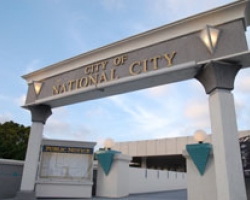The National City City Council on Tuesday approved a plan that will require drivers who cause serious accidents to pay for their emergency service response – a measure aimed at shoring up Fire Department finances.
The ordinance will apply only to non-residents of the city, and charges will only be assessed if a driver is found to be at fault in a given accident.
Mayor Ron Morrison said the charges are already a part of state law and the fees will be covered by insurance. He said the standardized fee schedule represents an industry-accepted level of repayment.
“This is something that has already been negotiated with the insurance companies. These are things that the insurance companies have already said are fair and equitable,” said Morrison.
State law already permits cities to assess these kinds of fees when drivers cause damage to public infrastructure – things like light posts and guard rails – if the damage is caused “willfully” or “negligently.” Although the law is on the books and the fees are collectible, many cities don’t pursue cost recovery.
The National City measure will create a contract with Fire Recovery USA, a private firm responsible for billing and collecting funds on behalf of the city. A staff report detailing a fee schedule said the charges can range from $275 for a basic fire response to more than $2,000 for large scale hazardous material cleanup.
The measure in National City passed by unanimous vote with little discussion. That’s in sharp contrast to the fate of a similar measure proposed in Chula Vista last month which met with far more public opposition and was ultimately pulled from the agenda at the last minute.
Critics say collecting fees of this kind are improper because tax dollars already pay for emergency services. National City’s staff report noted that the fee will be assessed only on out-of-town visitors, and thus would make up a cost normally born by taxpayers in National City.
When Chula Vista considered its version of the measure, the San Diego Tax Payer’s Association released a statement that decried the “stealth crash tax” and called the fees an example of double taxation. At the time, that group’s CEO Lani Lutar said the city should look for other ways to offset emergency service costs. Lutar did not return a phone call late on Wednesday to comment on National City’s version of the program.



